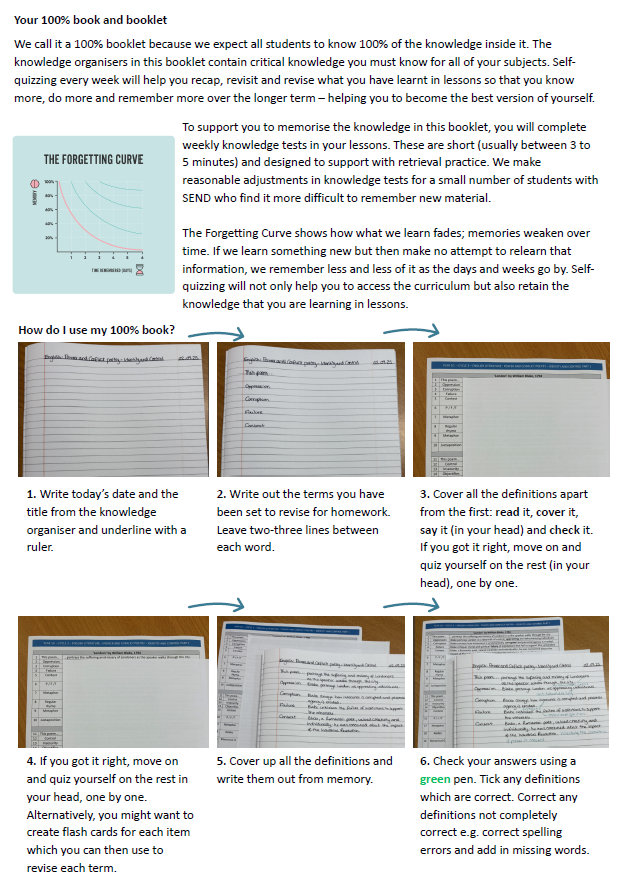- Home
- Curriculum
- Homework and Self-Quizzing
Homework and Self-Quizzing
Homework Overview
At Wyvern St Edmund’s, we believe that homework encourages the development of our students’ independent learning skills, allowing them to take ownership of their education. Not only that, but self-quizzing every week helps students recap, revisit and revise what they have learnt in lessons so that they know more, do more and remember more over the longer term – helping them to become the best version of themselves.
Promotion and emphasis of good homework skills and habits from the start of year 7 helps to prepare students for Key Stage 4 (and beyond) and, in turn, aids our students’ progression and development. We need your support at home to create the right conditions for effective homework completion so that all of our students can experience success with their learning.
To support students to memorise the knowledge in this booklet, they will complete weekly knowledge tests in lessons. These are short, usually between 3-5 minutes and designed to support with retrieval practice.
100% BookletsSelf-Quizzing TimetablesKnowledge Tests
How long should my child spend self-quizzing?
For each subject, we recommend 15-30 minutes of self-quizzing. For most of that time, students will be reading the terms, covering them up, saying the definitions aloud and checking how much they got right. The self-quizzing session ends with students testing themselves by writing out what they can remember and correcting it with green pen. Students can then repeat this final step to support their retention of the knowledge.
My child said they should spend 1.5-2 hours a night on homework – is that right?
We are recommending that parents and carers support their child to have a ‘digital detox’ time every night. We know that even just having a phone in sight erodes students’ attention and that many students have their attention split by trying to complete their homework alongside looking at their phone, listening to music or watching TV. A digital detox allows students to give their homework their full attention but that time can also be used for other important activities such as reading.
What does effective self-quizzing look like?
Read, Cover, Write, Check
Students learn key information in their knowledge organisers by reading a small section, covering it up, saying the definitions to themselves, writing out those key terms and definitions in their self-quizzing books,then checking to see if they got them right. They should correct any errors in green pen, then repeat the process.
Students should begin by setting their page up in their self-quizzing book with the title of what they’re self-quizzing on e.g. INSERT and the date. They should then write out the terms that they have been set leaving two-three lines between each word. Students should then cover all of the definitions apart from the first and the read it, cover it, say it and check it. If they get it right, they move on and quiz themselves on the next item and so on. Finally, students cover up all of the definitions and write out what they can remember – this will likely not be perfect and that’s OK! Finally, students check their answers using a green pen. They will tick any definitions which are correct, correct any spelling mistake or errors and add in any missing words.
Please see below for video tutorials:

When should my child do their self-quizzing?
Students have written a self-quizzing plan that is individual to them. When students do their homework is a matter for them – we know that lots of our students have other commitments outside of school so some days work better than others. The key thing is that they complete their homework within the week it is set and have it ready for their tutor to check on the day set out on our self-quizzing timetable.
What help is there at school for self-quizzing homework?
There is a daily homework club. Students can use this time to complete homework in a quiet environment. Your child’s tutor and subject teachers can also provide support and guidance. If you have any questions about homework, please contact your child’s tutor.
When will self-quizzing be checked?
Self-quizzing is checked during tutor time – please see the homework timetable. You will see that when subjects are checked weekly, they are checked on the same day each week to make it easier for students to manage their time and get into a routine. Knowledge tests will happen in lessons in the week after it has been set.
How can parents/carers support at home?
- Make sure your child brings their blue folder, self-quizzing book and 100% booklet to school every day.
- Check the self-quizzing timetable and encourage them to complete their homework in order of priority, completing the homework with the soonest due date first.
- Make sure your child has a quiet, well-lit place to do homework.
- Avoid having your child do homework with the television on or in places with other distractions. A digital detox provides the best conditions for learning.
- Be positive about homework; tell your child how important school is. The attitude you express about homework will be the attitude your child acquires.
- Help your child with time management. Help them to establish a set time each day for doing homework and don‘t let your child leave homework until just before bedtime.
- Encourage your child to attend homework clubs=. Homework clubs run every day after school.
- If you have any questions, contact your child’s tutor who is well-placed to support them.




